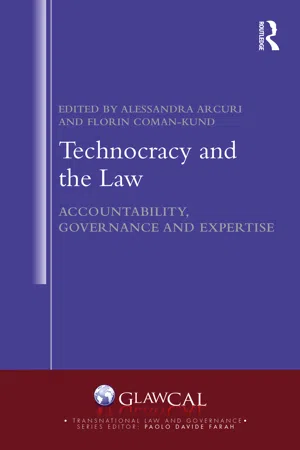
Technocracy and the Law
Accountability, Governance and Expertise
Alessandra Arcuri, Florin Coman-Kund, Alessandra Arcuri, Florin Coman-Kund
- 324 Seiten
- English
- ePUB (handyfreundlich)
- Über iOS und Android verfügbar
Technocracy and the Law
Accountability, Governance and Expertise
Alessandra Arcuri, Florin Coman-Kund, Alessandra Arcuri, Florin Coman-Kund
Über dieses Buch
Technocratic law and governance is under fire. Not only populist movements have challenged experts. NGOs, public intellectuals and some academics have also criticized the too close relation between experts and power. While the amount of power gained by experts may be contested, it is unlikely and arguably undesirable that experts will cease to play an influential role in contemporary regulatory regimes. This book focuses on whether and how experts involved in policymaking can and should be held accountable.
The book, divided into four parts, combines theoretical analysis with a wide variety of case studies expounding the challenges of holding experts accountable in a multilevel setting. Part I offers new perspectives on accountability of experts, including a critical comparison between accountability and a virtue-ethical framework for experts, a reconceptualization of accountability through the rule of law prism and a discussion of different ways to operationalize expert accountability. Parts I–IV, organized around in-depth case studies, shed light on the accountability of experts in three high-profile areas for technocratic governance in a European and global context: economic and financial governance, environmental/health and safety governance, and the governance of digitization and data protection.
By offering fresh insights into the manifold aspects of technocratic decisionmaking and suggesting new avenues for rethinking expert accountability within multilevel governance, this book will be of great value not only to students and scholars in international and EU law, political science, public administration, science and technology studies but also to professionals working within EU institutions and international organizations.
Häufig gestellte Fragen
Information
Part I
Perspectives on expertise and accountability in multilevel law and governance
1Conceptualizing expert accountability
1 Introduction
2 The notion of governance
Inhaltsverzeichnis
- Cover
- Half Title
- Series Page
- Title Page
- Copyright Page
- Contents
- List of figures
- List of tables
- About the editors
- List of contributors
- Acknowledgements
- Foreword by Paolo Davide Farah
- Introduction: Breaking taboos, talking accountability
- PART I Perspectives on expertise and accountability in multilevel law and governance
- PART II Expertise and accountability in economic and financial law and governance
- PART III Expertise and accountability in environment, health and (food) safety law and governance
- PART IV Expertise and accountability in digitization and data protection governance
- Index